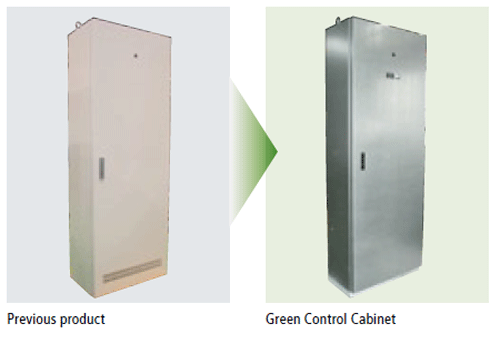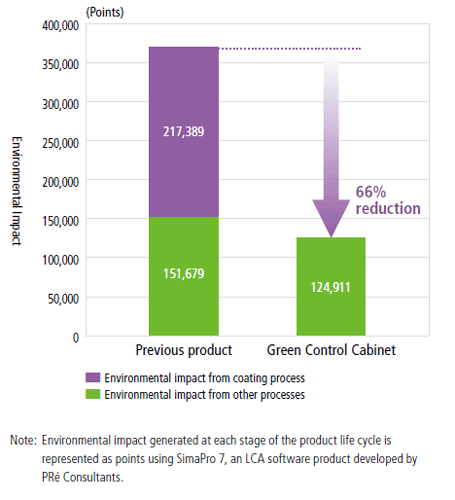The Environmentally Friendly Green Control Cabinet
Azbil Corpration has begun sale of the Green Control Cabinet, which was developed as an environmentally friendly cabinet for housing automatic control equipment such as controllers for use in its Building Automation business.
The Green Control Cabinet uses hot-dipped 55% aluminum zinc alloy-coated sheet steel (JIS G 3321), commonly called Galvalume sheet steel,* with superior corrosion resistance to the conventional baked-on coating, which uses organic solvents. As a result, its manufacture emits fewer volatile organic compounds (VOCs) than the manufacture of the previous product.
*Galvalume sheet steel is a registered trademark of Nippon Steel Corporation in Japan.

The Green Control Cabinet is compliant with the 2010 version of the Japanese government’s Standard Specifications for Public Works Construction (Mechanical Equipment Construction). The latest version of these standard specifications lists sheet steel that has been treated for corrosion (including hot-dipped 55% aluminum zinc alloy-coated sheet steel [JIS G 3321]) as an environmentally friendly alternative for automatic control panels. We promptly made the product commercially available as our response to the societal trend represented by this revision to the standard specifications.
In addition, a change in the assembly method from welding to riveting allows the Green Control Cabinet to be assembled efficiently even by unskilled workers. Together with the substantial reduction in the coating process, this shortens production lead time, thus reducing energy use.
The rivet-fastened structure also facilitates disposal, as the rivets can simply be removed when disposing of the cabinet.
Initiatives Using LCA
Life Cycle Assessment (LCA) is a method for comprehensively evaluating and quantifying the environmental impact of each stage of a product’s life cycle, from raw material procurement to manufacturing, shipment, use, and disposal.
In fiscal year 2003, ended March 31, 2004, Yamatake started an initiative using LCA to reduce the environmental impact of its automatic control panels. As a result, we recognized that the use of organic solvents in the coating process was having a significant impact on the environment.
Our consideration of the LCA analysis led to the following initiatives.
- We shifted from baked-on coatings that use organic solvents to baked-on powder coatings that emit virtually no VOCs.
- With the objective of reducing the energy used for baked-on coatings, we reviewed the materials we were using and considered alternatives to welding as the fastening method. As a result, we developed a rivet-fastened structure and decided to construct the cabinet out of hot-dipped 55% aluminum zinc alloy-coated steel sheet (JIS G 3321), which is compliant with the standard specifications mentioned above.
LCA Analysis Results

- Overall of Environmental Initiatives
- Contributing to the environment through our core businesses
- Reducing the environmental impact of our own business activities
